There’s no proven dosage of lime juice for delaying your period, despite some anecdotal claims. While lime juice is healthy, its effectiveness varies widely among individuals, and it lacks scientific backing for this purpose. Excessive consumption can lead to irritation in your mouth and stomach. Hormonal birth control is a more reliable method to manage your cycle. If you’re curious about other remedies and safety concerns, you’ll find more information ahead. Additionally, it’s important to consult with a healthcare professional before trying any remedies, as they can provide personalized advice based on your health needs. Remember that individual responses can differ significantly, and science has yet to clarify how lime juice affects periods for most women. Exploring safe and effective methods to manage your menstrual cycle will ensure you make informed choices for your health and well-being.
Key Takeaways
- There is no scientifically recommended dosage of lime juice for delaying periods, as effectiveness varies among individuals.
- Anecdotal claims suggest consuming lime juice a few days before your expected period may help, but evidence is lacking.
- Excessive lime juice can irritate the mouth and digestive system due to its high acidity.
- Hormonal birth control is a proven and safer method for period management and delay.
- Consult a healthcare professional for personalized advice on menstrual health and any concerns regarding period irregularities.
Understanding the Menstrual Cycle
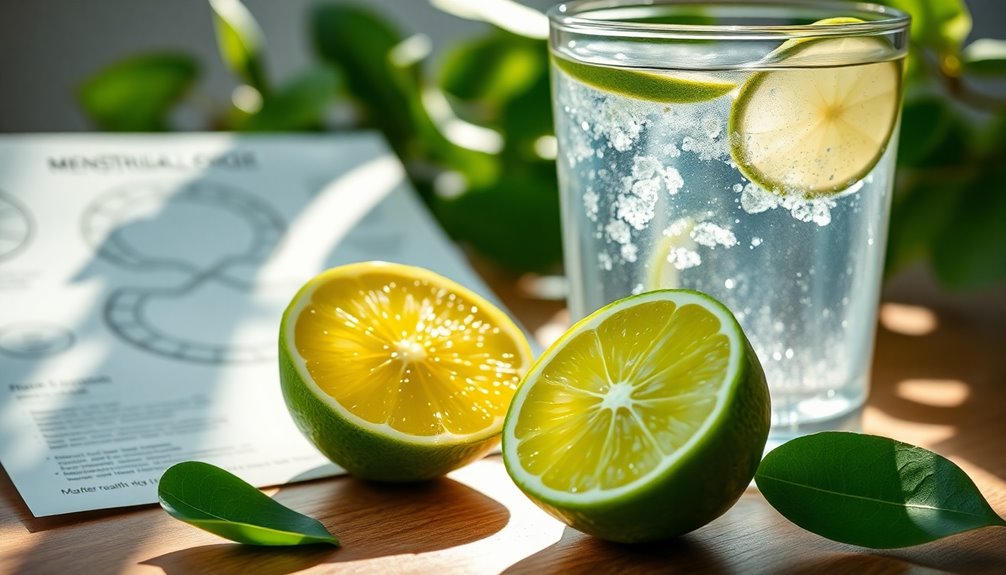
When you understand the menstrual cycle, you can better appreciate its complexities and how it affects your body. Typically lasting about 28 days, the cycle consists of four phases: menstruation, follicular, ovulation, and luteal.
Hormones like estrogen and progesterone regulate these phases. The follicular phase spans from day 1 to day 14, where follicle-stimulating hormone (FSH) promotes follicle growth and estrogen production, thickening the uterine lining. Menstruation is a natural part of the female body, which highlights the importance of embracing this natural process.
Around day 14, ovulation occurs, triggered by a surge in luteinizing hormone (LH). This is your peak fertility window.
Finally, the luteal phase lasts about 14 days, with progesterone preparing the uterus for a potential pregnancy. Understanding these phases can help you navigate your menstrual health more effectively.
The Role of Lime Juice in Health
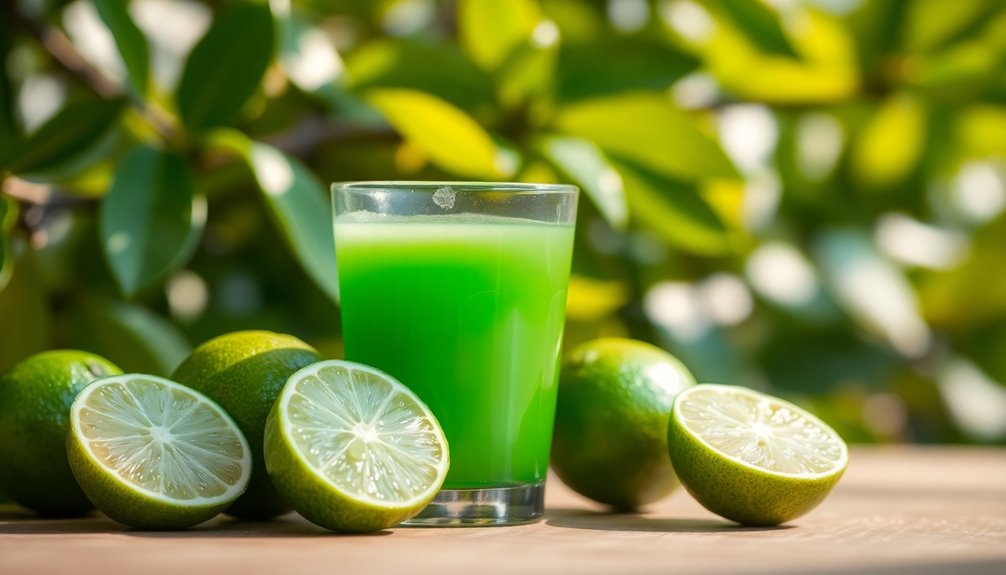
Understanding the menstrual cycle not only helps you navigate your health but also opens the door to exploring how certain foods can impact your well-being.
Lime juice, for instance, is a powerhouse of nutrients that can benefit your health in various ways. Its high vitamin C content boosts your immune system, helping you fend off infections. The citric acid in lime enhances digestion and may alleviate constipation. Additionally, the antioxidants in limes may lower stress on the heart.
Plus, lime juice promotes hydration, crucial for overall bodily functions. With its low calorie count and fiber content, it can aid in weight management.
Additionally, the antioxidants in limes fight inflammation, supporting skin health and reducing chronic disease risks. Incorporating lime juice into your diet can be a refreshing way to enhance your health.
Anecdotal Claims About Lime Juice and Period Delay
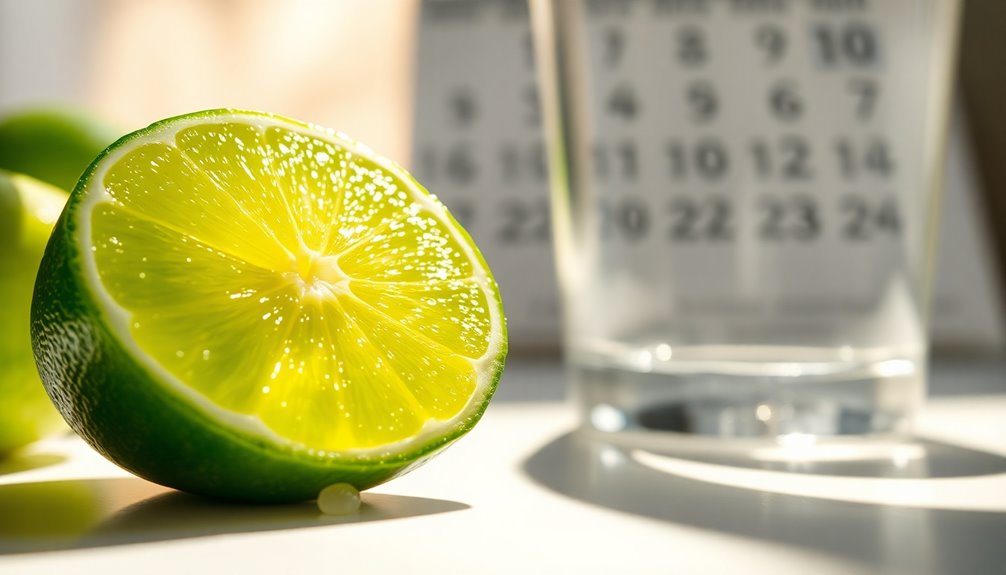
Many people claim that lime juice can delay periods, attributing this effect to its acidic nature and potential hormonal influence. They often suggest consuming lime juice a few days before your expected period date, but there's no specific recommended dosage. It's important to note that the effectiveness of lime juice varies widely among individuals, and there's no scientific backing for these claims. Some also combine lime juice with other methods, like dietary changes or exercise, for better results. However, excessive lime juice can irritate your mouth and digestive system. Always consider consulting with a healthcare provider before trying to delay your period, as they can offer safer, more effective options. Additionally, changes in dietary habits can influence menstrual cycle timing, which may also affect the outcome of using lime juice.
Scientific Studies on Lime Juice and Estrous Cycle
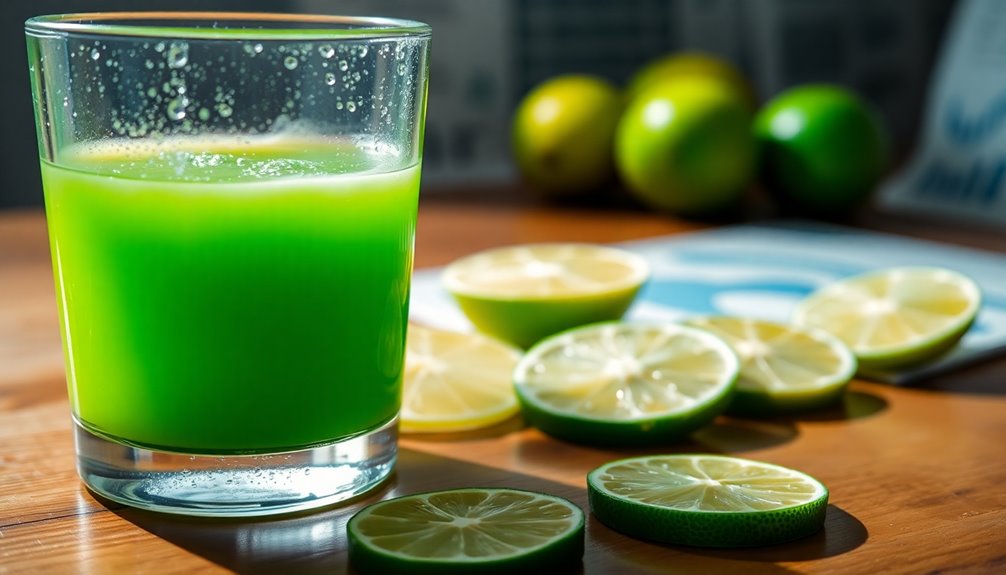
Scientific studies have revealed intriguing effects of lime juice on the estrous cycle, particularly in rat models. Research primarily focuses on Sprague-Dawley and Wistar rats, showing that undiluted lime juice disrupts the estrous cycle in 100% of subjects, while 50% diluted juice affects 80%.
All phases of the cycle are impacted, with ovulation partially blocked, leading to fewer ova being shed. Histological changes in treated rats reveal smaller ovaries and reduced ovarian follicles.
Additionally, low serum concentrations of reproductive hormones like FSH and LH are observed. These findings suggest that lime juice may compromise fertility and alter reproductive functions, raising concerns about its effects on overall reproductive health.
Other Natural Remedies for Period Delay
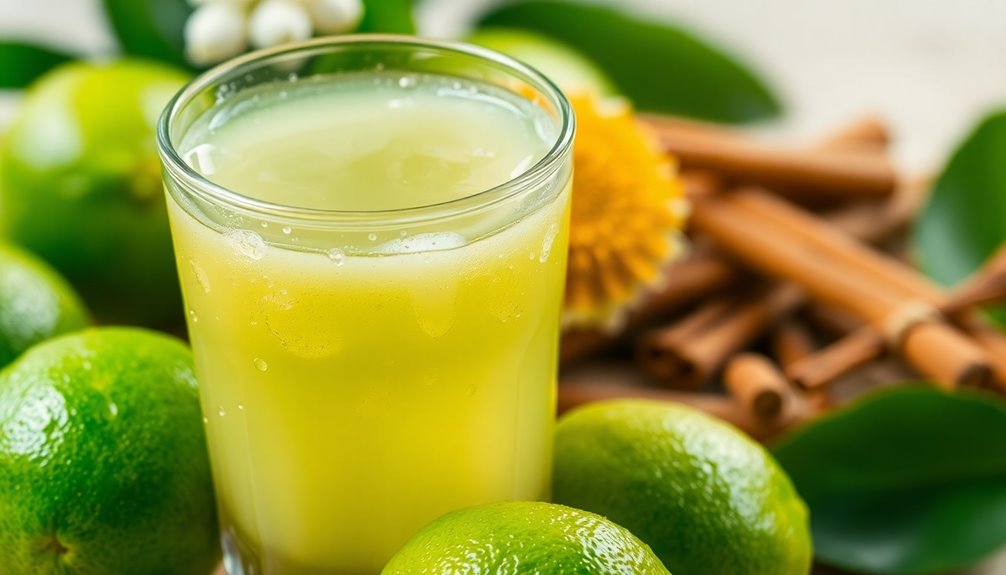
While lime juice has shown potential effects on fertility and the estrous cycle in studies, there are various other natural remedies that people often turn to for delaying their periods.
Foods like apple cider vinegar and tamarind pulp are believed to help, although scientific evidence is lacking. Some swear by gram lentil soup or cinnamon tea for their potential benefits. Additionally, apple cider vinegar may help delay periods when consumed with water.
Herbal options, like raspberry leaves and mango bark extract, are also popular. Additionally, altering your diet, exercise routine, and stress levels can impact your menstrual cycle.
While these methods are commonly shared, remember that their effectiveness varies, and consulting a healthcare professional is always wise for safe management of your period.
Safety Concerns of Using Lime Juice for Period Management

When considering the use of lime juice for period management, it's essential to recognize the safety concerns that accompany this approach.
There's no substantial scientific evidence that supports lime juice as an effective method to delay periods, and most studies on citrus juices are small and inconclusive. Additionally, excessive consumption can lead to irritation in your gums, throat, and stomach due to its high acidity, potentially causing digestive issues and tooth erosion over time. Unlike lime juice, hormonal birth control is proven safe and effective for period management, offering additional benefits like pregnancy prevention. Delaying or skipping periods can be acceptable with medical guidance, making it important to explore proven methods instead of relying on unverified remedies.
Always consult a healthcare provider before trying to delay your period to ensure you're making safe and informed choices.
Comparing Lime Juice With Hormonal Birth Control

Many people look for alternatives to hormonal birth control for managing their menstrual cycles, often considering natural options like lime juice.
While some suggest lime juice might help delay periods due to its citric acid content, there's no scientific evidence to back this up. Natural remedies often lack the scientific backing necessary to demonstrate their effectiveness in delaying menstruation.
In contrast, hormonal birth control effectively regulates hormonal cycles, proven to delay or prevent periods. It offers consistent cycle regulation and can even lighten or stop periods altogether.
Although hormonal methods can have side effects, these are generally well-documented and manageable. Plus, they provide additional health benefits, including reduced cramps.
Ultimately, if you're serious about delaying your period, hormonal birth control is a more reliable option than lime juice.
Lifestyle Changes That May Affect Menstrual Cycles

Lifestyle changes can significantly impact your menstrual cycle, often leading to irregularities. Changes in diet, for instance, can play a crucial role; incorporating foods high in omega-3 fatty acids, calcium, and vitamin D may help alleviate PMS symptoms. Additionally, regular exercise can ease menstrual pain by boosting serotonin and endorphin levels. Recent research indicates that (75% of participants) reported experiencing menstrual cycle changes during the COVID-19 pandemic, underscoring the influence of lifestyle factors on menstrual health. Don't underestimate the power of stress management; high stress can disrupt your cycle, so practicing relaxation techniques is essential. Maintaining consistent sleep patterns also promotes menstrual health, helping to reduce symptoms. The pandemic highlighted how shifts in lifestyle habits, like diet and exercise, could lead to hormonal changes affecting your menstrual cycle. Being mindful of these factors can help you maintain a more regular cycle.
When to Consult a Healthcare Professional
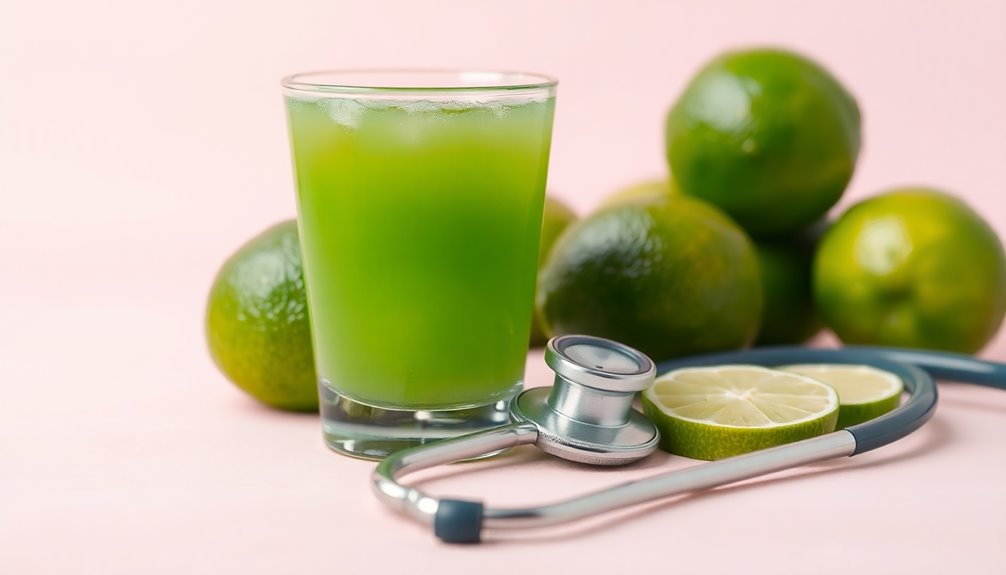
It's crucial to know when to seek help from a healthcare professional regarding period delays, especially if you notice significant changes in your menstrual cycle.
If your periods are consistently closer than 24 days apart or longer than seven days, it's time to consult a doctor. Missing three consecutive periods or not starting menstruation by age 16 also necessitates a visit. Hormonal imbalances can also lead to irregular cycles, so it's important to discuss any concerns with your healthcare provider.
If you're sexually active and experience a late period, take a pregnancy test. Severe pain, heavy bleeding, or bleeding between periods should never be ignored.
Additionally, unusual symptoms like weight changes alongside missed periods warrant professional evaluation.
Frequently Asked Questions
Can Lime Juice Affect My Menstrual Cycle if I'm on Birth Control?
If you're on birth control, lime juice isn't likely to affect your menstrual cycle.
There's no evidence suggesting that lime juice interacts with hormonal contraceptives. While some natural remedies claim to influence periods, they lack scientific support.
Relying on lime juice for menstrual regulation mightn't be effective, so it's best to stick with what's proven.
Always consult your healthcare provider for the safest options tailored to your needs.
Is There a Specific Amount of Lime Juice Recommended for Period Delay?
Trying to use lime juice to delay your period is like chasing shadows—there's no solid evidence it works.
There's no specific amount recommended for this purpose because studies haven't proven its effectiveness.
While some natural remedies are mentioned online, they lack scientific backing.
If you're considering delaying your period, it's best to consult a healthcare provider for reliable options like hormonal contraceptives, which are far more effective and safe.
Are There Any Long-Term Effects of Consuming Lime Juice Regularly?
If you consume lime juice regularly, you might face some long-term effects. You could experience digestive issues like acid reflux or stomach discomfort due to its acidity. Additionally, those with sensitive stomachs may find that high acidity exacerbates their discomfort, leading to ongoing digestive challenges. Moreover, while lime juice offers various health benefits, it’s essential to balance its intake with other nutritious beverages. For instance, cranberry juice side effects explained could provide insights into how excessive consumption of even healthy juices can contribute to digestive issues.
Your dental health might suffer, with increased sensitivity and potential tooth decay from enamel erosion.
However, lime juice also provides benefits like boosting your immune system with vitamin C.
Moderation is essential to balance these effects and maintain overall health while enjoying its advantages.
How Quickly Can Lime Juice Potentially Delay My Period?
Lime juice likely won't effectively delay your period. Lack of legitimate research shows no definitive delay.
While some studies hint at reduced menstrual bleeding, timing isn't impacted. If you're considering changes, consult a healthcare provider for safe solutions.
Hormonal methods offer reliable results, while natural remedies like lime juice remain uncertain.
Prioritize your health and monitor any changes, because your well-being should always come first when addressing menstrual concerns.
Can I Combine Lime Juice With Other Remedies for Better Results?
You might be curious about combining lime juice with other remedies for better results. However, there's no scientific evidence supporting this approach.
Mixing lime juice with substances like apple cider vinegar or raspberry leaves doesn't guarantee effectiveness. While some natural remedies may provide benefits, they often lack research backing, so be cautious.
Always consult a healthcare provider before trying any combination, as individual responses can vary and you want to prioritize your health.
Conclusion
In your quest to manage your period, think of lime juice as a key on a piano—while it might create a lovely note, it won't compose the entire symphony. Anecdotal stories abound, but the science isn't solid. Just as a musician knows when to seek help for their craft, you should consult a healthcare professional before relying on natural remedies. Remember, your body's rhythm deserves expert guidance, not just a squeeze of lime.
Cindy thoroughly researches juicing trends, techniques, and recipes to provide readers with practical advice and inspiration. Her writing style is accessible, engaging, and designed to make complex concepts easy to understand. Cindy’s dedication to promoting the advantages of juicing shines through her work, empowering readers to make positive changes in their lives through the simple act of juicing.











